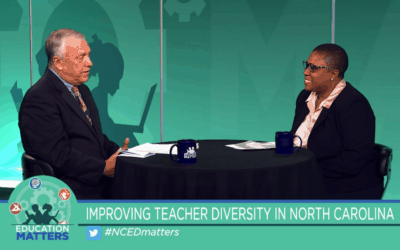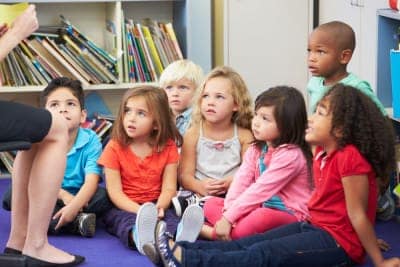Today on the show we are going to provide an update on educating during COVID-19 and discuss meeting the needs of exceptional children and English language learners during this challenging time. Here to discuss are three education professionals coming from one side of the state to the other.
Guests:
- Dr. Scott Elliott, Superintendent of the Watauga County Schools
- Dr. LaChawn Smith, Deputy Superintendent, New Hanover County Schools
- Dr. Maria Madison, Principal, College Park Elementary School
The following is Tom Williams’ “Final Word” from this episode of Education Matters. Williams is chairman of the Public School Forum of North Carolina.
As any great teacher will tell you, one of the most exciting things about their profession is that no two days are exactly alike. From the spontaneity of a kindergartener who experiences for their first time sitting on the new hook and ladder fire truck in their local community to the senior in high school sharing news of their acceptance letter to their top choice university, these moments illustrate what makes the teaching profession so rewarding.
During this past month, as our students, parents, and teachers have transitioned to the necessity of a one hundred percent remote learning environment, the adage that no two days are exactly alike continues to ring true.
Our teachers continue to seek ways to deliver the most effective learning experiences for their students to develop their essential basic academic skills, expand their knowledge, and help each student make new connections between what they are learning and how it relates to their future needs and aspirations as a lifelong learner. As our guests on today’s show shared, meeting the unique academic and personal needs of our two hundred thousand plus students served by our exceptional children’s program presents new challenges and barriers.
Parent-teacher-school relationships are even more critical at this time to be sure communications are open and to the best of everyone’s ability the needs of the child stay central to the remote learning and services needed.
Similar to our exceptional childrens’ unique needs are those of our English language learners. Extra time and additional resources are required of our new remote learning setting to assure these students, and their parents, receive the support they need to minimize each child’s academic loss between now and when schools are reopened. Even in the most ideal of conditions, meeting the diverse needs of these two important groups of our students is challenging. When compounded by the range of home circumstances, access to the internet and devices, and language barriers, our teachers need and deserve our full support in helping them to stay connected and engaged with their students and parents.
While we all recognize the daunting task ahead of our state leaders during this time, and as they begin preparing for our recovery from COVID-19, they must be sure that meeting their constitutional requirement for all students to receive a sound basic education moves to the top of the list. Their plan should be reflected in their approach to new or revised state policies as well as in their funding priorities of both current and new federal or state funding.
North Carolina has a rich history of pulling together in times of a state crisis and I remain confident that North Carolina will come out on the other side of this pandemic more committed to meeting the needs of our one point five million students, their parents, and our teachers and staffs.
Recommended reading



